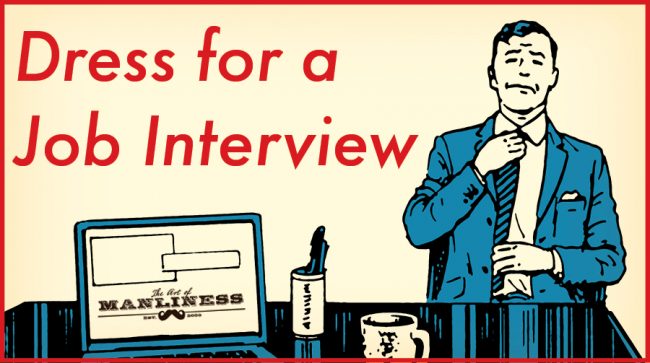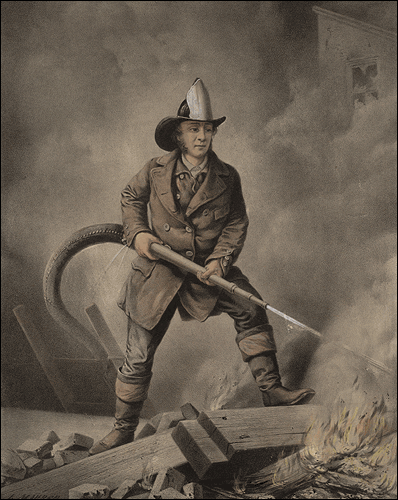“Tell me a little about yourself.”
It’s a seemingly innocuous request — an invitation that’s really an open-ended question. But that openness is what makes it such a difficult query to answer. Which of many possible responses should you give, what things should you mention, and how much should you say?
“Tell me a little about yourself” is a request you get from a professor on the first day of class, the leader of a new group you’ve joined at church, a job interviewer, or someone you meet at a party. Whether the situation is social or professional, a halting or rambling answer can really get the interaction off on the wrong foot, stymying the emerging conversation and hindering your first impression.
Today we’ll talk about how to give an effective and compelling answer when someone asks you to share a little about yourself. We’ll cover what to say when this question comes up in a job interview, as well as in social situations like the first day of class.
How to Answer “Tell Me a Little About Yourself” in a Job Interview
“Tell me a little about yourself” is one of the most common ways for an interviewer to kick off an interview. It breaks the ice and gets the conversation going. But don’t be lulled into thinking it’s just a time for pleasant chit-chat — the “official” interview has most definitely already begun. Most interviewers make their decision about the candidate within the first five minutes of the interview, so how you start things off matters a lot. Giving a confident, effective answer to this frequent first question will set the tone for the rest of the interview.
But the open-endedness of the query causes many candidates to stumble right out the gate. How far should they go back in their work history? Should they talk about their education? Should they share a chronological timeline of all their previous jobs, or just highlights from their most recent one? In that moment of confusion and hesitation, what comes out of the candidate’s mouth is often a whole lot of hemming and hawing.
So let’s first talk about the most common variations of these undesirable responses, and then discuss how to craft a more effective answer.
How NOT to Respond
The non-response, response. “I don’t know what you want me to tell you. It’s all there on my resume.”
This response will mark you as someone overly literal, obtuse, cranky, and/or cagey. The hiring manger isn’t looking for a verbatim recitation of what’s on your resume; rather, the request is to be translated as career coach Peggy McKee suggests: “Tell me something that will matter to me as I consider you for this job.” The interviewer doesn’t want a list of bullet points, but for you to connect those dots for them.
A chronological monologue on your education and work experience. “I majored in accounting in college and received a 3.7 GPA. My first job after graduation was at X Company, where I worked as…Then two years later I moved to Y Company, where my role included…Most recently I worked at Job Z, where…”
The interviewer has all this information on the resume in front of them, so there’s no need to give a full chronological tour of your credentials. It’s tedious and they’ll start tuning you out.
A soliloquy on your own goals and interest in the job. “I’ve always wanted to be a software engineer, and I feel like this is my absolute dream job.”
It’s great for you to have high hopes about the job, but the hiring manager is most interested in what you can do for them.
Oversharing. “Well I was born in Macon, Georgia, but my family moved to Pittsburgh when I was ten, and I’ve been here ever since. I’ve been in the construction industry for fourteen years now. I really liked my last job, but then the foreman started having an affair with my wife, and of course he pushed me out. And now I don’t have a job or a wife, and I’m just looking to start over again.”
An interviewer’s not looking for many personal details of your life — just stick to the highlights of your work experience.
Vague overeagerness. “I’m willing to do whatever it is you need.”
A hiring manager wants to hear specifics about what you bring to the table; it’s details, rather than generalities, that will invite follow-up questions and get the conversation going.
How to Respond
Potential employers sort through hundreds of resumes and may interview a dozen candidates. After awhile, all those guys in suits and gals in pencil skirts turn into one big blur of resume bullet points, and the hiring manager will start categorizing folks and lumping them together. Your job is thus to break from the pack right from the get-go — as soon as they say: “So tell me a little about yourself.”
Here’s how:
Keep your response short. Your answer should last no longer than about a minute. Any longer and the interviewer will start to lose interest. Don’t repeat yourself. Don’t ramble.
Realize that you don’t have to say everything you want the interviewer to know about you in this statement; rather, the goal should be to say things that invite follow-up questions in areas that will allow you to elaborate on your strengths.
Start with a brief bio of your work history. Succinctly summarize the highlights of your resume.
- “I started my first business when I was 19, I’m a graduate of the University of Oklahoma’s College of Business, and I’ve been the sales manager for X Company for the last five years.”
Give a concrete example about the value you could bring to the employer. What unique skills and experiences do you have that set you apart from other candidates? How do your own goals align with those of the potential employer? How are you going to bring value to the company and help them reach their objectives?
A hiring manager is most interested in what you’re going to bring to the company’s table. You should have already spent some time brainstorming the needs of the potential employer and how/where they align with your own strengths (here’s exactly how to do this). You’ll want to weave these “matches” into your response by offering a concrete example of a time you used your skills to solve a problem, save money, or improve quality — one that directly overlaps with the company’s objectives.
- “At Company X, I helped introduce three new hit products to their line-up and increased sales 5% each year I was there. I feel confident I can do the same for your company.”
Mention things that point to positive underlying qualities. You don’t want to brag in your response, but you do want to seem valuable and confident. One way to walk this line is to mention things that point to positive underlying qualities without spelling them out explicitly. For example:
- “I graduated college in three years.” (points to work ethic)
- “I was the youngest person ever to be made sales manager.” (points to beyond-your-years competency)
Mention anything you have in common with the interviewer. If you’re able to research the person who’ll be interviewing you beforehand, or notice something in their office you have in common, mention it in your response. Maybe they went to the same college, belonged to the same fraternity, or once worked for the same company as you. Or let’s say you know they’re originally from Texas and so are you. While you wouldn’t normally mention the fact you grew up in Texas in your response, you would want to with that interviewer. People like people who are like themselves.
Keep it all relevant. Relevancy is the byword of a good response. Just because you’re proud of something, doesn’t mean it’s relevant to the company you’re interviewing with.
Putting It All Together
The basic principle of a good “Tell me a little about yourself” response is to cover as much territory as you can in as small a space as possible; you don’t know what’s going to pique the interviewer’s interest, so you want to include as many things as possible that might get the conversation going, with a focus on things that show your strengths, and invite follow-up questions that allow you to elaborate on them. It’s basically a little elevator pitch, where what you’re pitching is yourself.
Here’s an example of how all the above points could come together to form a compelling and effective response to a hiring manager who’s from Texas and is looking for an ambitious self-starter to improve his company’s sales:
“I grew up in Texas and then crossed the border to attend the University of Tulsa for my undergrad. I earned my degree in accounting in three years, and also started my own business my sophomore year, which I was able to sell after I graduated. I got my MBA from the University of Oklahoma’s business college, and interned with Y Company during that time. I’ve spent the last five years working for X Company, where I was the youngest person ever to be made sales manager. I helped introduce three new hit products to their line-up and have increased sales 5% each year I’ve been there. I feel confident I can do the same for your company.”
It’s succinct, but covers a lot of ground. Think of all the promising follow-up questions the interviewer can now ask:
- Oh you’re from Texas? What part?
- What kind of business did you start in college?
- How did you graduate from college in 3 years?
- Why did Company Y decide to make you manager at such a young age?
- What new products did you introduce at Company Y?
- How have you been able to improve their sales 5% each year?
It pays to always know what you’re going to say before the interview, rehearsing it to yourself a few times over. With a little effort, you can really get the interview off on the right foot.
How to Answer “Tell Me a Little About Yourself” in a Social Situation
In comparison to answering “Tell me a little about yourself” in a job interview, coming up with a response to this query in a social situation is pretty simple and straightforward.
Just as in the interview context, you want to keep it short (again, less than a minute), while offering up some interesting tidbits that may invite follow-up questions. Here you’re not trying to impress anybody per se, you’re just giving folks a sense of who you are, whether you might have things in common, and fodder for things they might talk to you about — whether the conversation is going to continue in that moment, or whether they might come up to you after class to ask you about something you said.
Here are some things that are typically appropriate to mention in various situations:
The First Day of Class:
- Where you’re from
- How you decided to attend that college (especially if you’re from out-of-state)
- What your major is, or if you’re like, totally undecided
- Why you’re taking the class and what you hope to get out of it (professors enjoy hearing this; it’s also a question that can convey a lot of your personality to your classmates)
- A unique, funny, and/or random fact about you (you used to be in the Army and did a tour in Iraq; you drive a PT Cruiser that your aunt gave you and kind of love it; you play a mean harmonica; you once had hair down to your butt; Bill Clinton kissed you as a baby at a 1996 campaign rally; you just got home from serving a two-year mission for your church in Brazil). A unique fact can make your classmates laugh, or simply make you memorable.
A New Club/Meet-Up/Church Group
- Where you’re from, if you just moved into the area
- What brought you to your new home (again, if you just moved in)
- How you came into the club’s interest or faith
- Why you joined the group, and what you’re looking for out of it
- Any talents or interests the group might put to use
- A unique, funny, and/or random fact about you
Meeting Someone New at a Party/Conference
- Where you’re from
- What you do for a living
- Why you’re at the conference
- How you know the party host
Part of the art of small talk is not just coming up with things to say yourself, but offering up material that makes it easy for people to know what to say/ask in response. So just think about throwing out a few things that will make other folks want to get to know more about you, while making it as easy as possible for them to do so.








